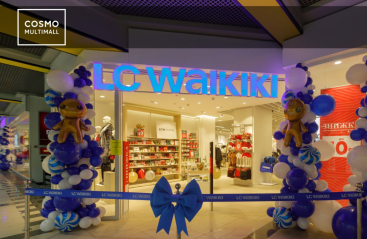What consumer trends are setting new generations at the expense of which it is possible to attract and retain the attention of "millennials" and Z generation, and what will depend on the success of retail networks in the near future.
“Amazon is not eternal. In fact, I'm sure that one day it will collapse and go bankrupt. " It would be logical to assume that this prophecy belongs to competitors of the Internet giant or supporters of "brick" retail. However, he was voiced by Jeff Bezos, founder, mastermind, and head of the largest online retailer in the United States. It would seem that nothing is bad now: sales and value of the company are growing steadily. According to the latest Global Top 100 ranking by PricewaterhouseCoopers, an international consulting firm, Amazon is among the top three companies in the world with a capitalization of $ 875 billion.
However, at a meeting with company employees Jeff Bezos said that large companies live about 30 years, but longer than others remain successful those who are "obsessed with consumers". "If we shift the focus from consumers to ourselves, it will be the beginning of the end," - concluded the businessman. One of the most talented entrepreneurs of the XXI century understands perfectly what the future of any business depends on and knows how important it is to meet the present and anticipate the future expectations of the consumer.
We live in a changing world, perhaps the most dynamic in human history. Consumer preferences are also changing rapidly. The Y or Millennials, born in 1984–2003, and even more so the Z generation (2004–2023) growing up in the world of smartphones and the public internet, are dramatically different from their predecessors. They have a different attitude to leisure and shopping; they make different decisions about buying offline and online, with other social values and life priorities.
All this directly influences the formation of retail real estate and e-commerce markets. What do retailers and online stores need to take into account in order to win the loyalty of the Y and Z generations, and which Ukrainian retailers have already started to change in the future?
Millennials are the key audience for most businesses today.
Sell emotions, not goods
Millennials are the key audience for most businesses today. And although marketers have conducted hundreds or even thousands of surveys on the purchasing preferences of this generation, not all retailers can win their loyalty. For "players", shops and malls have become not only a place for shopping but also a place for entertainment. They go to the mall not only (and not so much) for purchases, but for experience, emotions and impressions.
Time is one of the most valuable resources for millennials, and they do not want to spend it on "boring" purchases. Rather, people of this generation will prefer to spend time with friends, go to the movies, socialize in a cafe or restaurant on a food court. That is why retail and development around the world seeks to reorganize their retail spaces, making them more comfortable not only for shopping but also for leisure. These trends are also evident in Ukraine: many shopping centers are expanding their food courts and movie theaters, as well as expanding their entertainment areas.
The same goes for retailers. One of the most striking foreign examples of the "store of the future" is the flagship of the Nike sports brand in New York. This retail space of more than 6,300 square meters. m enables the buyer to gain a unique customer experience by combining elements that feature both offline and online retail. In addition, it saves customers time with the Nike Express format, featuring the most popular collections of products. You can also find showcases with a detailed explanation of the manufacturing process and the innovations introduced by the company.
This is another important nuance, because the millennial generation is living in a world of hyper-choice, so they want to understand why they are giving away their money. In addition to leisure and time, there is another extremely important aspect for the "players" aspect - emotions. The store is no longer allowed to be the place of purchase only when needed. Emotional context is very important, it is also understood by Ukrainian retailers who are trying to offer buyers an unforgettable consumer experience in their retail space.
For example, one of the leaders of the Ukrainian grocery retailer - the Silpo network, sells its new supermarkets in exclusive conceptual formats: in Cherkasy the company opened an oriental bazaar shop, in Lutsk - in pop art, in the new Kyi Mall in the style of yachts Club and more. Not only can the last buy buy all the necessary products, but they can also spend their time directly in the grocery store, such as a pizzeria, bar, cafe, or restaurant area.
Another example of retail electronics is the flagship store Citrus on Khreshchatyk. On the territory of the point of sale, the company has implemented robotics and 3D creativity studios, virtual reality zones, as well as a TeHab training space, created specifically for meetings with celebrities, thought leaders and bloggers.
All this enables the retailer to attract additional audience and increase customer loyalty.
As for e-commerce players, they are primarily focused on saving consumers time. In the future, the time factor will continue to be one of the key competitive advantages of online over brick retail. E-commerce players will increasingly need to simplify their purchasing process and shorten delivery times. Who will not be able to answer - inevitably loses the competition and leaves the field defeated.
Save the world, not your business
However, another change in generations of solvent buyers is not far off. Generation Z is already a significant part of consumers, and every year its role will become more and more important. According to experts, by 2020, Z generation will make up 40% of the world population. In the US alone, their purchasing power this year will be approximately $ 44 billion.
How can retailers expect to receive some of this money?
Marketers agree that those solutions that work well with millennials will not be so relevant for Z generation.
Generation Z is the first in history to grow in the digital world. So it is not surprising that it is deeply involved in digital technology. Accordingly, communication with this audience online will play an important role.
Which channels will be the most effective?
Deloitte, an international research firm, recently published the results of the global 2019 Third Millennium Generation Survey. As it turned out, the confidence of the Y and Z generations in the media is falling, so they want to get information from different sources. At the same time, millennials and Z generation often express concern about the influence of social networks, but a large proportion of respondents (71%) are generally optimistic about the use of digital devices and social networks for personal purposes. These research findings suggest that brands will have to look for alternative channels of information to consumers, as well as unconventional ways of delivering content.
Another interesting fact of the study is that the list of priorities of the young generation in the first place is not a car, housing or children, but travel the world and the desire to benefit society. In addition, the desire to make the world a better place applies not only to climate change and the environment, but also to consumer goods or services.
This is why the Z generation and millennials prefer to buy from companies whose policies are in line with their beliefs: 42% of respondents said that they have started or expanded relationships with those companies whose products benefit society or the environment. This trend is confirmed by a recent Facebook study. As a result, Generation Z often lays aside its differences and unites around ideas that will benefit society. They expect the same from brands.
More than half (61%) of young consumers are willing to pay more for an "ethical" product, and 77% will be more loyal to a brand that promotes gender equality in social networks.
Companies will increasingly need to take into account the values of their target audience and respond to them, as well as to care not only for their sales, but also for the interests of the public.



